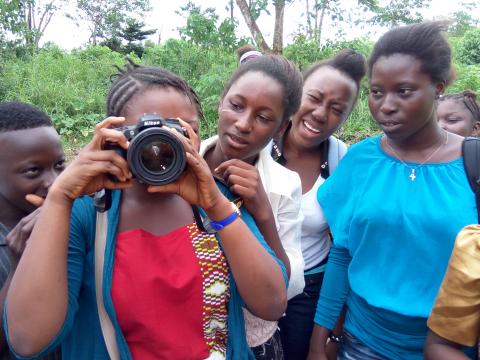Fifty-five children trained in Communications for Development

Fifty-five children have been trained in communications for development (C4D) in Bo District, southern Sierra Leone. The children represented all seven World Vision’s Area Development Programmes (ADPs) in Bo, southern Sierra Leone.
In 1997, through Article 6 of General Assembly Resolution 51/172, the United Nations adopted the following formal definition of Communication for Development:
‘’Communication for development stresses the need to support two-way communication systems that enable dialogue and that allow communities to speak out, express their aspirations and concerns and participate in the decisions that relate to their development’’.
Since then, other definitions of C4D have been advanced that reflect increased understanding of the role of C4D in development processes. In 2006, the Rome Consensus from the World Congress on Communication for Development defined Communication for Development as:
‘’…a social process based on dialogue using a broad range of tools and methods. It is also about seeking change at different levels, including listening, building trust, sharing knowledge and skills, building policies, debating and learning for sustained and meaningful change. It is not public relations or corporate communications.’’
Simply put, (C4D) is a broad term used to refer to all the different types of communication that need to take place in societies if sustainable democratic development is to occur.
C4D, according to World Vision International (WVI), is the integration of community-based and child-focused communications technologies, tools and story-telling in World Vision development programmes.C4D enables valuable community learning and life skill, to help achieve each of World Vision’s child well-being outcomes (CWBOs). It is also referred to as catalyst for community voice. In C4D, WV seeks to amplify the voice of children, women and men alike in communities, with a view to bringing change. C4D is community owned and driven communications.
In many parts of Sierra Leone, children are found on the bottom rung of the ladder—they are not allowed to speak in many fora, especially where elders are present. It starts from the home where the child’s participation is limited. Advocacy and silence do not match. Advocacy brings out the issues and social problems and ills of the society.
If children are to speak out and amplify their voices, they need the requisite knowledge and skills to be able to do that. As such, children were trained in jingle development, community drama, dialogue, taking still and video images, interviewing skills, moderating radio programmes that seek to address child-related issues and other harmful traditional practices.
The training was facilitated by Sahr Ngaujah, Communications Officer, World Vision Sierra Leone, alongside World Vision Sierra Leone’s Child Protection staff in Bo.
This first wave of training looked at a cocktail of issues affecting children and how these issues can be addressed using C4D effectively.
In recent times, Sierra Leonean children have experienced a lot of child-related abuses (rape in particular), the C4D training introduced components of Child Protection, as the topic C4D in Child Protection resonates with the children who, after the session, drew up an action plan in order to be responsive to child-related abuses in their various communities using the skills they have acquired.
Key among this plan was:
Engaging local leaders, Faith Leaders, doing jingles and community drama in order to send a message across, radio discussions moderated by children themselves; reporting crimes by filling incident forms; continued awareness raising right from the home to their communities at large.
Amijatu Bondo, 14, from Tikonko ADP says: ‘’I will continue to stand up and advocate for young girls like me in my community. I will let perpetrators know that there is a penalty if you rape a girl. I will use all the skills I have acquired in this C4D training in order to put a stop to violence against children. I will not be afraid to publicly shame perpetrators on radio, jingle, until rape is minimized in my community ’’
It has been recorded in World Vision Sierra Leone’s CP file, that Amijatu has, in the recent past, reported two cases of sexual abuse, and this led to the arrest of the perpetrators and the father of a victim who failed to report the incident (rape of her child).
Fatmata Lume says ‘’I will call upon all members of Kids Club in my community to report any child abuse issue to our local rulers.’’
-----ENDS----